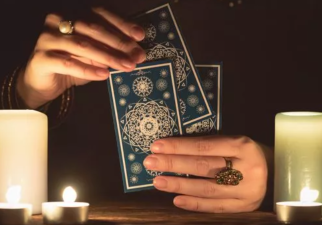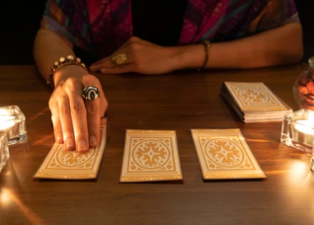Tarot Reading Goes Mainstream on Social Media
Tarot divination is a form of divination that claims to predict the future, helping businesses improve their fortunes, ward off disasters, and alleviate personal worries.
Tarot divination is a form of divination that claims to predict the future, helping businesses improve their fortunes, ward off disasters, and alleviate personal worries.
Popularity of divination culture:

The popularity of astrology
- Astrology interprets and predicts human affairs and personal destiny through the study of the movements and positions of celestial bodies. It believes that the positions and relationships of planets influence a person's personality, emotions, and life stages. Astrology is widely used through social media, entertainment programs, and daily social interactions. Young people generally use horoscopes as a tool for personality analysis and emotional prediction, even giving rise to popular terms like "horoscope."
The rise of tarot and card divination
- Tarot originated in 15th-century Italy as a card game, which later evolved into a divination tool. A tool for divination and spiritual guidance. It is divided into the Major Arcana and the Minor Arcana. The Major Arcana's 22 cards depict various symbolic images, addressing major themes of the universe and the human spirit. The Minor Arcana's 56 cards are divided into four suits, similar to modern playing cards, representing different aspects and states of life. Tarot divination has rapidly gained popularity through short video platforms and offline experiential activities, becoming a way for young people to socialize and relieve stress. Some businesses have combined it with psychological counseling, giving it a "scientific" label.

Analysis of the reasons for its popularity:
- The convenience and entertainment of cultural communication
The internet and social platforms have provided the technical foundation for the spread of Western divination. Fragmented content like short videos and memes has lowered the threshold for cultural acceptance, making social media platforms a key platform for its dissemination. A large number of tarot readers and astrologers have joined the ranks. Divinationists share their knowledge, case studies, and interpretations on platforms like [website name/username/username], [website name ... Across the entire industry chain, including product sales, merchants have actively promoted divination through various marketing strategies, further fueling the spread and popularity of divination culture.
- Social and Psychological Needs
The popularity of Western divination among young people stems from a variety of factors. Socially, the fast pace of modern life and intense competition create numerous challenges and anxieties regarding academics, employment, and relationships. Unable to find effective guidance in reality, young people tend to turn to divination for psychological comfort and spiritual sustenance. Culturally, with the acceleration of globalization, young people are drawn to the mystique and unique nature of divination. The ambiguity and positive implications of horoscopes provide an outlet for young people to express their emotions, while traditional divination, lacking similarly "lightweight" forms of expression, has gradually become marginalized.
